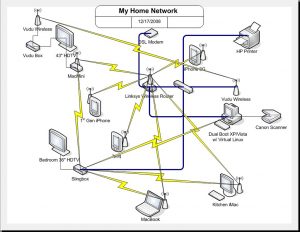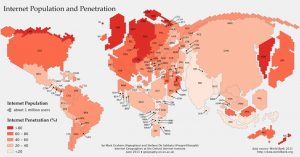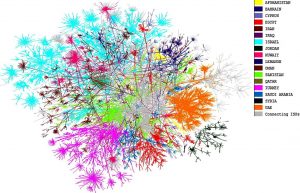It began as a confined military experiment called ARPANET, then it expanded rapidly during the last twenty years and became global. Now Internet includes all computer networks, and it’s hard to imagine our society without it.

image source:https://search.creativecommons.org/photos/7e858a43-016f-4fc5-bfe6-e768700d7029 by leopeng2
The internet revolution started in the late 1960s and early 1970s thanks to a new network technology created by the U.S. Department of Defense. It was known as the Advanced Research Projects Agency Network (ARPANET).
Its purpose was to connect various scientists and researchers across the United States. Researchers incorporated ARPANET into the networks they were working at including universities. As more and more networks joined the system, the internet began to take shape.
how does it work?
In basic terms, the internet is a global interconnected collection of networks that communicate using internet protocols. You can think of it as a network of networks where every network is a node.

image source: https://search.creativecommons.org/photos/596dd457-1240-4384-b547-18c0e026809c
A combination of them is often used to make these connections:
- Network Adapters or Interface Cards are hardware installed in our computers. Though not a node themselves, they allow computers and electronic devices to join a network as a node;
- Network switches are central nodes that forward messages between nodes in the same network by rapidly creating and deleting connection points. You can think of them as the managers of the network, maintaining the flow of information;
- A Network router is a device that connects two or more separate networks. Routers forward data to other routers of different networks until the data has reached its destination;
- Wireless access points (WAP) allow nearby computers and nodes to interact with a network without, usually via WiFi connection, which is used to indicate the strength of your connection to a WAP located in your Local Area Network (LAN).
how can you access it?
Wired internet is the most common form of connection to the internet. Hundreds of thousands of miles of wires are laid throughout the world. They range from phone lines (DSL) to fibre optic cables. This is the ideal and fastest way to access the internet.

image source: https://search.creativecommons.org/photos/9d6420dd-ccd3-473f-9804-0ada2fc6fa18 by andersabrahamsson
Satellite internet is usually required when there are no wired connections available in the local area to connect to the internet, such as third world countries and areas with low populations. Though satellite is relatively fast, it’s still slightly slower than wired connections due to longer transmission distance.

image source: https://search.creativecommons.org/photos/6bd1304b-d263-4cee-9db9-c6c508cc01b1 by jurvetson
info source: https://en.wikipedia.org/wiki/Internet
